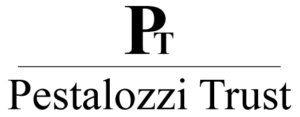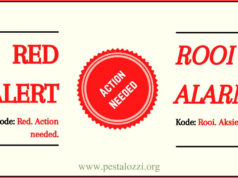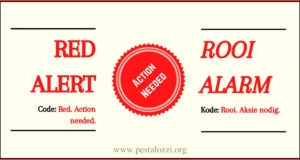One of the problems which emerged during the meetings with the education department which the Pestalozzi Trust attended, is that the DBE was unhappy about the small number of homeschoolers registering for home schooling. Not more than 5% of homeschoolers are registered with the DBE as home learners
According to the proposed new, as yet unpublished, policy and law on home schooling, referred to by dr Simelane during the GDE Lekgotla 2017, it appears as if the DBE intends to solve this problem by stronger regulation. Extensive monitoring and assessment, to which parents who register their children with the DBE as learners at home, agree, now will become part of the home schooling law and policy.
Assessment was also mentioned in a short series of talks on home schooling, which was recently aired on RSG (30 April 2017 and 7 May 2017 ). The first talk covered general aspects of home education, by Bouwe van der Eems and other homeschoolers, while the second talk featured Coleen Cronjé from Brainline and prof Rita Niemann from Impaq. Prof Niemann mentioned that registered homeschoolers will have to comply with many compulsory assessment requirements.
It is not clear why we as homeschoolers should be excited about this system of assessment. It is another matter altogether if you have a company crammed full of “competent” assessors, ready to assess homeschoolers. Then you also would have been thrilled. Think about the financial gain for the company; think about the enormous amount of information gathered about the learners, their parents and their circumstances, in a country in which the parents of the learners are used to bow to fica and rica.
Uniform assessment presupposes uniform curriculum and uniform teaching methods, leading to the formation of uniform learners. This reminds one of the language used by one of the education ministers of the ANC: “We are gunning for the same critical outcomes – we are gunning for the same South African citizen” (Me Tidimalo Nkotoe in 2004 on Carte Blanche).
A few points to ponder:
- Parents choose learning materials in the best interest of their children. What is going to happen if their chosen materials do not agree with those of the state? How will assessment be done then?
- Will this intensive assessment be in the best interest of the learner?
- Will it be proof that LEARNING has taken place?
- Will this kind of assessment be reliable and valid? The assessors probably won’t know the child or the learning materials.
- Has any research been done which shows that more intensive assessment leads to better education? The outcomes of the schools in Finland have proven the opposite.
In the article “South Africa’s Outlaw Educators“ (Other Education: The Journal of Educational Alternatives, p 91) Leendert van Oostrum comes to the conclusion:
The state’s attempt to control every form of education in South Africa subjects all learners to a dysfunctional and overregulated system – a kind of “death by management”. The system regulates teaching, but cynically indemnifies itself against any expectation that it will ensure learning.
The over-regulation probably will result in homeschoolers disappearing even more under the radar, and even fewer homeschoolers probably will register their children with the DBE. It could therefore have a result opposite to that which the DBE probably is aiming at.
Indeed, parents who decide to homeschool their children do it with the best interests of their children at heart, and it is first and foremost PARENTS who decide what is in their children’s best interest, not the state. Unless the state can show that the requirements can indeed be reconciled with the best interests of their children, they will not be able to submit to such a violent regime.
While schools worldwide are entering a new phase in which quality education often disappears, many governments are of the opinion that the solution for the crisis in education simply is more stringend monitoring and regulation, as for example in Italy, some states in the US and in England. The Pestalozzi Trust will defend the rights of its members and those of their children by protesting against such a policy of over-assessment and overregulation. Therefore, we strongly recommend that member families continue to educate their children according to the best interests of each child and in accordance with the religious or philosophical convictions of the family. The Trust will dispute on their behalf any government attempt to interfere with their universally recognised right to do so.






Recent articles in the media indicate that education in South Africa is poor when compared to countries like Tanzania and Zimbabwe. Homeschoolers therefore only need to match his poor quality in order to “comply” with any prescribed standards.
Hi Steve
Thanks for your comment.
I would love to receive references to these articles comparing HE in SA with that in Zimbabwe and Tanzania.
Thanks!